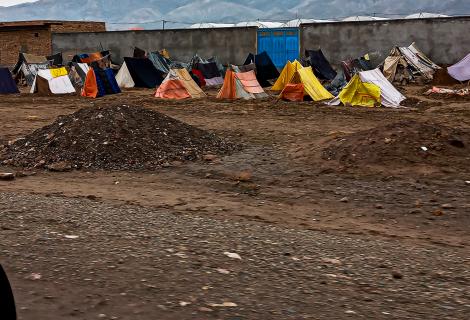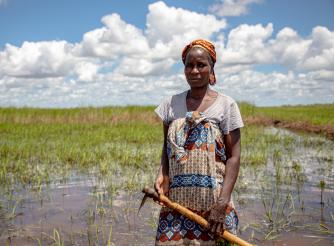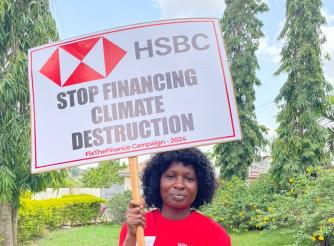COVID-19 crisis shows South Asia is unprepared to protect climate migrants

As more people than ever are forced to flee extreme weather disasters, new research finds that South Asia is unprepared to protect climate migrants, as the COVID-19 crisis deepens existing inequalities.
The Internal Displacement Monitoring Centre’s (IDMC) latest Global Report on Internal Displacement 2020 (GRID 2020) finds that in 2019, 24 million people were displaced by extreme weather disasters, up 48% from 16 million in 2018. This includes more than 9.5 million displaced by disasters in South Asia, the highest figure since 2012.
It comes as early findings from ActionAid led research into climate migration and displacement in South Asia highlights the grim reality for people, particularly women, forced to flee their homes due to prolonged drought, flooding, cyclones, sea level rise and other disasters that are becoming increasingly frequent and severe due to climate change.
South Asia is a climate disaster hotspot, accounting for 38.3 per cent of the global total number of displacements in 2019, according to the GRID report.
Harjeet Singh, ActionAid’s global lead on climate, says: “Record numbers of people are being displaced by extreme weather disasters, fuelled by climate change.
“After suffering devastating losses of livelihoods and loved ones, they try to rebuild their lives elsewhere, but often end up in risky, informal jobs, living hand to mouth.
“COVID-19 has exposed how poorly migrant workers are treated, as overnight in Bangladesh factories were shutdown leaving garment workers with no way to earn a living. In India, tens of thousands of workers with no job security left cities to walk hundreds of kilometres back to their villages.
“This pandemic must act as a wake-up call to governments about the need for social protection measures to ensure that climate migrants get basic services like food, education, shelter and security. It is also an opportunity to ensure that supporting farmers and communities to become more resilient to climate change is built into long term response plans.”
The new briefing, Climate migrants pushed to the brink, published today by ActionAid and Climate Action Network South Asia (CANSA), finds that climate-induced displacement and migration is under-researched and poorly understood.
People who move from rural to urban areas are often described as ‘economic migrants’, but this ignores the role climate change plays in making their traditional livelihoods no longer viable.
Due to decades of conflict in Afghanistan, the link between climate disasters and migration has not been explored, although farming has been badly hit by regular and devastating flooding, and prolonged drought. In 2018, deadly drought displaced more people than the Taliban conflict.
Researchers visited the Shaiday displacement camp in Herat province, which was first set up due to the conflict. Now the majority of those living there have been forced to flee their homes due to drought and recent flooding.
Ali Mohammad lost everything after flooding destroyed his home in Badghis province, north west Afghanistan, killing his son and two daughters.
Ali and his fifteen-year-old daughter moved to Shaiday, where they receive some support from NGOs, but are struggling to rebuild their lives. Ali tries to find work as a day labourer and when this is not an option, he sells scrap metal for $1 a day.
He says: “I’m very grateful for the support I have received, but it’s not enough to cover the most basic human needs for me and my daughter. We’re cold and hungry, and my daughter cannot go to school.”
Massoud Eiman, senior researcher at Tadbeer Consulting and Research Organisation, which is conducting the research in Afghanistan, says:
“Increasingly, people in Afghanistan are being displaced not by conflict, but by the impacts of climate change and this is set to increase. But it is an untold story and many families, like Ali’s, are suffering, living in limbo, without protection and struggling to get by.
“National governments must recognise the growing problem of climate-induced migration, invest in building resilience and protect vulnerable communities and migrants through appropriate policies.”
ActionAid and CANSA partners are conducting interviews with people displaced by climate change in Afghanistan, Bangladesh, India, Nepal, Pakistan and Sri Lanka.
Studies in Bangladesh show that impacts of soil salination due to rising sea levels on agriculture is undermining food security and could be displacing more than 200,000 people annually. It could eventually displace more than two million people.
The Bangladesh government has a draft strategy to address disaster displacement and a National Adaptation Plan in the works, but social protection policies for climate migrants are urgently needed to support millions of people being made homeless and pushed further into poverty by the impacts of climate change.
ActionAid spoke to Maleka, a 16-year-old girl, who wanted to be a teacher but is now a domestic worker in Dhaka.
She was forced to leave her village in the Sunamganj district, where her parents and five other siblings still live, following her older sister to the capital to help their family tide over one crisis after the next.
The family have had to rebuild their home four times in the past eight years due to flooding and heavy rainfall. Her father is disabled due to an injury and unable to work, her mother also has health problems. The family faces food shortages, a lack of sanitation, debt and diseases.
Maleka had to drop out of school and move to the city to help meet their basic needs. She says: “My dream does not matter anymore. God had a different plan perhaps.”
Sanjay Vashist, director of CANSA, says: “Climate change is forcing people to migrate across borders in South Asia to survive and make an alternative living.
“If this continues, the peace in South Asia will be threatened and will lead to more conflicts between communities and disagreements between countries. Such threats need to be mitigated through regional dialogue.
“South Asian Association for Regional Cooperation (SAARC) countries should pay heed to the unfolding climate disaster and cooperate urgently to avert and minimise and address the issue.”
Sedef Dearing, ICMPD regional coordinator for the Silk Routes region, says: “The evolving trend of climate-induced migration is still invisible and poorly understood as a 'push factor' of a new migration pattern in many countries.
“In South Asia, severe impacts of extreme and increasingly unpredictable weather conditions destroy livelihoods and force large numbers of people in rural areas to seek survival opportunities in cities and consequently often across borders.”
Ends.
For more information and interviews contact Jenna.Pudelek@actionaid.org, +44(0)7795642990 or Jess.Midwinter@actionaid.org +44(0)7857436362.
Notes to editors:
ActionAid’s new briefing, Climate migrants pushed to the brink, provides background information about climate migration and displacement in South Asia. It shares initial findings of research on climate change-induced migration in six countries in South Asia: Afghanistan, Bangladesh, India, Nepal, Pakistan and Sri Lanka. Read it in full: https://actionaid.org/publications/2020/climate-migrants-pushed-brink
Read Ali Mohammed’s story: https://actionaid.org/news/2020/fleeing-climate-crisis-ali-mohammed
Read Maleka’s story: https://actionaid.org/news/2020/fleeing-climate-crisis-maleka
ActionAid and Climate Action Network South Asia (CANSA) are working in six countries across South Asia on climate-induced displacement and migration, with support from Bread for the World, Germany and the European Union, through the International Centre for Migration Policy and Development (ICMPD).
ActionAid is a global federation working in more than 40 countries for a world free from poverty and injustice. For more information visit https://actionaid.org/.


